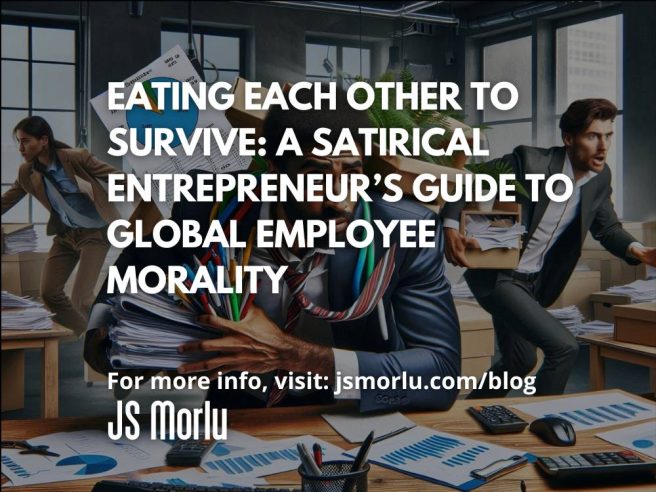By: John S. Morlu II, CPA
Welcome to the Jungle of Preconventional Morality
If you’ve ever hired in developing countries or disadvantaged environments, you’ve likely noticed something: employees aren’t necessarily plotting how to build your business for the next 10 years. No, they’re plotting how to survive lunch. Forget “vision statements” and “mission alignment” — many are stuck in what Kohlberg politely calls the preconventional stage of morality. I call it the “I’ll eat you first before you eat me” stage.
At this level, ethics isn’t about integrity. It’s about survival. Rules aren’t followed because they’re right — they’re followed because there’s a stick waiting. Incentives aren’t pursued because they build long-term wealth — they’re pursued because rice is expensive today. You can wave around your company’s “core values” on posters and have motivational speakers roll through town, but to someone in raw survival mode, “integrity” just means don’t get caught.
Think of it like jungle law: the lion doesn’t sit around debating morality with the zebra. He eats. And if he’s still hungry, he eats again. That’s the same moral framework many employees are carrying into your carefully built organization.
Example #1: The Case of the Missing Pen
Fun fact: in some offices, pens don’t last 24 hours. Why? Because for someone thinking in survival mode, a pen isn’t a tool — it’s a resource. A resource that can be sold, traded, or hoarded like gold. The same person who takes the pen will tell you with a straight face that they “value honesty.”
It starts with pens, but it never ends with pens. Next thing you know, reams of A4 paper walk out the door, staplers vanish like magic tricks, and printer toner disappears as though there’s a black-market demand for cyan cartridges. And there is. I once saw an office where the cleaner was selling pens and printer paper on the street outside — technically, he was just running a parallel distribution channel.
Punchline: You thought you were running a business. They thought you opened a stationery shop.
Example #2: Salary as a Lottery
Ever wonder why some employees act like payday is a jackpot? It’s because, to them, your payroll isn’t a system — it’s a lottery draw they won by showing up. The preconventional worker doesn’t save, doesn’t plan, doesn’t invest. By Monday after payday, they’re broke, and by Tuesday, they’re asking for an advance.
Fun tidbit: according to one study, in some economies over 70% of workers spend their entire paycheck within 72 hours. Not because they’re living lavish — but because survival mode trains the brain to prioritize immediate consumption over future planning. A cow slaughtered today is meat to be shared today, not an investment for next week.
So while you, the entrepreneur, are thinking in terms of “quarterly performance” and “year-end profits,” your employees are thinking in terms of “tonight’s beer and tomorrow’s taxi fare.”
Punchline: You thought you were building careers. They thought you were an ATM that sometimes asks annoying questions.
Example #3: The Short-Term Hustle
Entrepreneurs dream of scaling; survival thinkers dream of today’s hustle. They’ll happily manipulate, misrepresent, or sabotage tomorrow’s success if today’s belly is full. It’s the same logic as street food vendors selling yesterday’s rice with today’s flies — hey, it’s money now, who cares about reputation?
Historical parallel: Rome fell not just to invaders, but to bread-and-circus politics. Feed the people today, tomorrow can collapse on itself. The same applies in your small business — if everyone’s chasing short-term gratification, the empire crumbles while the circus plays on.
And here’s the kicker: many of them know they’re killing the golden goose. They just don’t care, because goose stew tastes good tonight.
Punchline: Long-term planning is like organic kale. Nobody buys it when fried chicken is cheaper.
The Manipulative Olympics 🥇
Another hallmark of survival-mode employees is manipulative schemes. They’ll guilt-trip you (“My cousin’s cousin’s goat died, so I need leave”), fake loyalty (“Boss, you are like a father to me” — until someone else offers $20 more), or weaponize incompetence (“I didn’t do it wrong, the computer did”).
Fun fact: anthropologists have found that in environments of scarcity, humans develop advanced manipulation strategies as survival tools. Translation: they could have been world-class negotiators, but instead, they’re negotiating how to avoid Excel.
I call this the Manipulative Olympics. Categories include:
- 100m Sprint in Excuses — “I was late because the rain was heavy.”
- High Jump of Flattery — “Boss, without you this company is nothing.”
- Marathon of Borrowing — “I’ll pay you back at the end of the month” (spoiler: they won’t).
Punchline: You hired an “accountant.” You got Machiavelli with an abacus.
Entrepreneur’s Survival Guide (Common Sense Edition)
So what do you, the small business owner, do in this jungle?
1. Systems, not speeches. Don’t preach ethics to people in survival mode. Build systems where manipulation isn’t worth it. For example: require receipts for every transaction. Watch how suddenly, expenses shrink.
2. Trust, but verify. Remember Reagan’s Cold War advice. Audit everything, twice. If you don’t, your balance sheet becomes a fantasy novel.
3. Incentives over ideals. Tie survival to the company’s survival. If they win only when the company wins, suddenly long-term thinking becomes attractive. Give profit shares, not pity loans.
4. Cull fast. A manipulative survivor can drain you faster than a luxury car. Keep them, and your business becomes their buffet. Think of it as removing termites from your foundation — slow to notice, quick to collapse.
5. Philosophy training? Optional. Better to give them KPI dashboards than Dostoevsky. At least dashboards can yell back.
Closing Warning
Entrepreneurs often think employees are “partners in growth.” No. Many are partners in survival theater. If you mistake their performance of loyalty for actual loyalty, you’ll end up financing someone else’s hustle while your dream bleeds to death.
Kohlberg was right — most of the world hasn’t even reached conventional morality. And if you, the entrepreneur, don’t protect yourself with systems, clarity, and discipline, you’ll end up like the naïve farmer in Aesop’s fables: fattening the fox that eats your chickens.
Punchline to remember: Employees stuck in survival mode don’t think in decades. They think in dinners. If you don’t feed their stomachs and discipline their schemes, they’ll eat your business alive — one pen, one paycheck, and one manipulation at a time.
Author: John S. Morlu II, CPA is the CEO and Chief Strategist of JS Morlu, leads a globally recognized public accounting and management consultancy firm. Under his visionary leadership, JS Morlu has become a pioneer in developing cutting-edge technologies across B2B, B2C, P2P, and B2G verticals. The firm’s groundbreaking innovations include AI-powered reconciliation software (ReckSoft.com) and advanced cloud accounting solutions (FinovatePro.com), setting new industry standards for efficiency, accuracy, and technological excellence.
JS Morlu LLC is a top-tier accounting firm based in Woodbridge, Virginia, with a team of highly experienced and qualified CPAs and business advisors. We are dedicated to providing comprehensive accounting, tax, and business advisory services to clients throughout the Washington, D.C. Metro Area and the surrounding regions. With over a decade of experience, we have cultivated a deep understanding of our clients’ needs and aspirations. We recognize that our clients seek more than just value-added accounting services; they seek a trusted partner who can guide them towards achieving their business goals and personal financial well-being.
Talk to us || What our clients says about us




